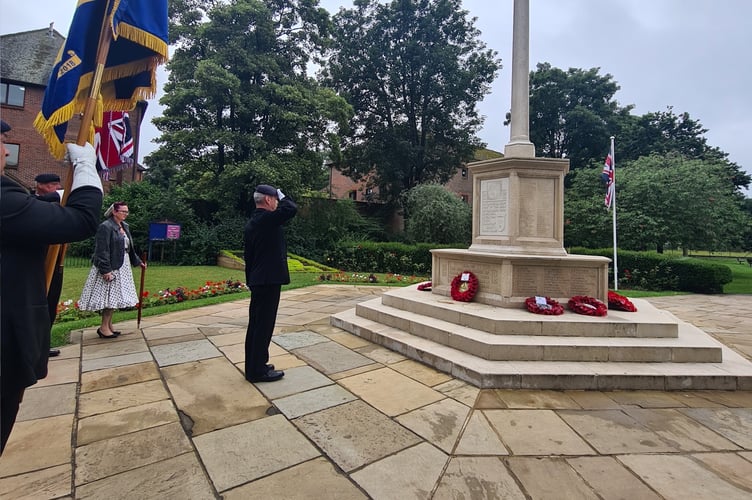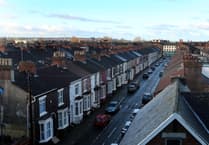The Royal British Legion Farnham branch has commemorated the 70th anniversary of the end of the Korean War.
Almost 60,000 British combat troops saw action during the 1950 to 1953 conflict, a war that has never formally ended.
Of these, 1,100 were killed.
Legion parade leader Ian Hunter said during the short service at Farnham war memorial: “Seventy years on many veterans of the conflict feel the war in Korea is the ‘forgotten war’.
“But for those who fought and experienced it, and live with its legacy today, it should never be forgotten.”
Following the end of Japanese occupation in 1945 it was agreed by the United States and the Soviet Union to divide Korea into two occupation zones.
What was intended as a temporary border resulted in partition: the communist Democratic People’s Republic of Korea (North Korea) and the American-backed Republic of Korea (South Korea).
The new governments claimed rule over all of Korea and neither accepted the border as permanent. On June. 25, 1950, after years of clashes along the border, the North Korean People’s Army invaded South Korea, overwhelming the south’s forces.
In response, the USA called on the United Nations Security Council to invoke the UN Charter and declare the North Koreans as aggressors.
This would be the first war in which the UN took an active involvement and called on all members to help the South. The USA was the first to respond with UN combat troops to support South Korea, followed by a further 14 nations, including the UK.
The North Koreans made rapid progress and captured the South’s capital Seoul, driving the South Korean and American troops to the coastal port of Busan.

In late August 1950 the first British ground forces arrived in Korea. Soon after, Royal Navy ships participated in the counter-offensive that started with the South Korean and American amphibious landing at Incheon, behind North Korean positions, which allowed the UN forces to break out of the Busan bridgehead.
UN forces, including 27th Commonwealth, rapidly advanced north and crossed the border, capturing the capital Pyongyang. By late November they were within 40 miles of the Chinese border. Alarmed, China entered the war, sending forces that pushed the UN Forces back into the south in freezing winter conditions as low as -40 C.
In April 1951 Chinese forces launched an offensive focusing on Kapyong and the Imjin River to break the UN line, and then Seoul would once more be within striking distance. On the night of April 22, the Chinese attacked, outnumbering UN forces three to one.
Chinese forces numbering some 40,000 attacked the British 29th Brigade, which was supported by Belgian forces along the Imjin River. Despite being heavily outnumbered, troops of the 1st Battalion, Gloucestershire Regiment, defended Hill 235 on the river for three days before they were forced to retreat amid heavy casualties. Chinese forces took more than 500 prisoners. The 1st Battalion was later awarded the United States Presidential Unit Citation for their gallantry.
Imjin River was one of the bloodiest battles fought by the British Army since the Second World War. The sacrifice of the British and Belgian forces gave the UN Forces opportunity to retreat to a stronger defensive position where they eventually halted the North Korean and Chinese troops.
For the next two years troops faced a stalemate near the border; in trenches little more than a mile apart they withstood extreme conditions of cold and heat.
An area around a ridge overlooking the Imjin River known as ‘the Hook’ had been a focus for control and two battles had repulsed Chinese forces. In May 1953 it was successfully defended again, this time by The Duke of Wellington’s Regiment (West Riding).

Charlie Daynes, of the Duke of Wellington’s Regiment, said: “On the night of May 28, 1953, I was selected to go out on patrol in no-man’s land on a feature called Green Finger – one of the spurs leading from the Hook. We were in readiness to go out when Hell let loose and the third battle of the Hook had begun… Unfortunately, our patrol commander was killed instantly, so we took shelter in the nearest bunker."
Finally in July 1953 an armistice agreement was signed, although no peace treaty has ever been concluded, and thousands of former prisoners on each side were returned.
In total about 60,000 British and over 50,000 Commonwealth service personnel served during the Korean War, with British casualties being more than 1,100 killed in action and more than 2,500 wounded.
Nearly 37,000 Americans lost their lives.
It is estimated that over half a million North Korean and Chinese troops were killed and at least half a million South Korean personnel were killed or injured. The civilian cost of the war was extremely high, estimates are that a total of two million North and South Korean civilians were killed.
July 27, 2023, marked the anniversary of the armistice of what many call ‘the Forgotten War’.
It was overshadowed by the end of the Second World War and the subsequent ‘Cold War’, and yet the sacrifice of the allied Armed Forces was extremely high, and its legacy still has a global impact.




